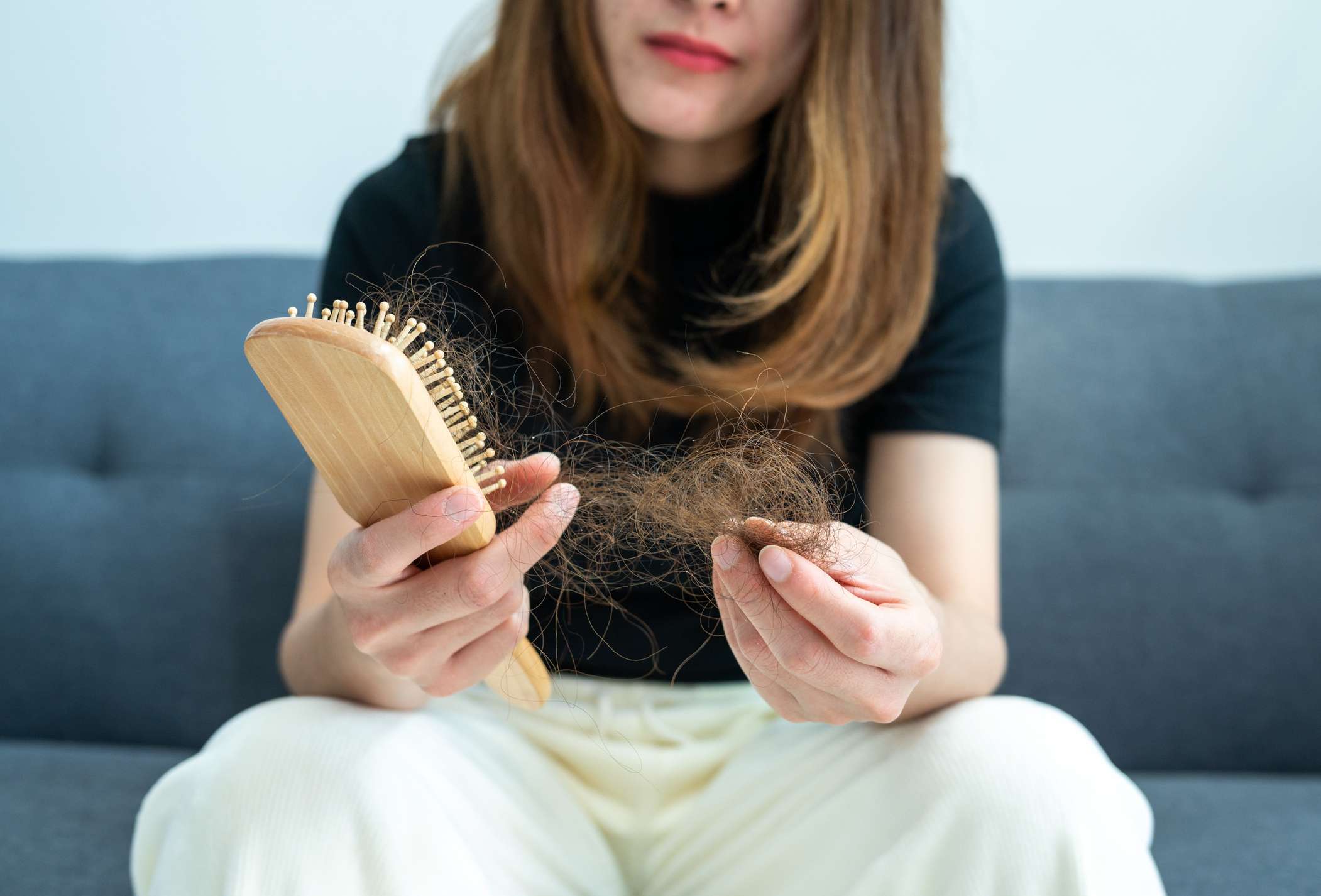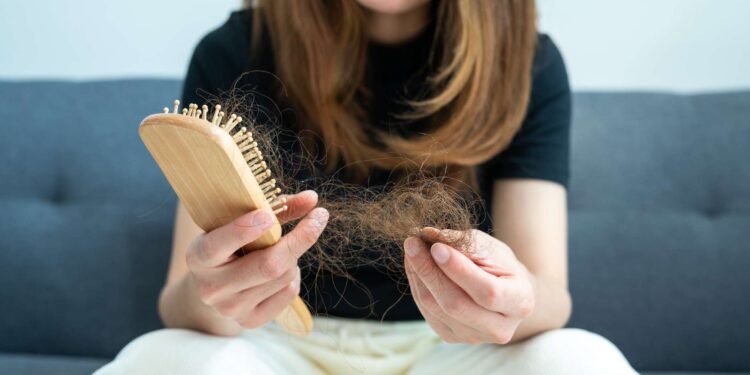
Chronic (long-term) stress can lead to noticeable hair loss, usually months after a stressful situation occurs.
Research suggests stress hormones may affect hair follicle stem cells, interfering with the normal hair growth cycle. This type of hair loss isn’t usually permanent, and there are ways to manage and prevent stress-related hair loss.
Physical, mental, or emotional stress can trigger certain types of hair loss.
Table of Contents
Telogen Effluvium
Sudden or rapid hair loss, medically known as telogen effluvium, is the most common type of hair loss caused by stressful events. It can be brought on by extreme stress, including:
- Giving birth
- Life changes like caregiving for a family member, going through a divorce, or losing a job
- Emotional distress or mental illness
- Recovering from surgery, cancer treatment, or a major illness—particularly if it caused a high fever
- Certain health conditions, like hyperthyroidism (overactive thyroid), hypothyroidism (underactive thyroid), or iron deficiency anemia (low red blood cell count)
- Rapid weight loss of 20 pounds or more
- Stopping hormonal birth control pills
- Certain medications, like retinol or beta-blockers
Telogen effluvium hair loss usually occurs around three months after a stressful event—and hair may start growing back naturally within six months or more. While it’s typically temporary, the hair loss can become chronic if the stress remains.
Trichotillomania
Stress can also contribute to hair loss through trichotillomania, a disorder in which people pull out their own hair habitually.
Many people with trichotillomania report experiencing a stressful event before starting to pull out their hair. For this reason, experts believe that trichotillomania may be a coping mechanism for stress that turns into a habit.
Treatment often includes cognitive behavioral therapy (CBT) and stress management techniques to help stop hair-pulling. Stopping the behavior should stop the hair loss that comes along with it.
Alopecia Areata
Alopecia areata is a form of hair loss that can also be stress-induced. The condition develops when the immune system mistakenly attacks the hair follicle cells, leading to bald patches or complete baldness.
Research suggests that emotional or psychological stress can trigger alopecia areata in people who are already at risk for the condition, which is considered to be an autoimmune disorder.
This means that while alopecia areata can flare up after a stressful event or illness, other factors can also lead to this type of hair loss. Some of these different factors are still being studied.
Hair loss happens when a trigger (in this case, some form of stress) disrupts your natural hair growth cycle. As a result, the hair follicles stop growing.
Hair grows in three stages, driven by stem cells inside the hair follicles: anagen, catagen, and telogen. During the last phase, hair naturally falls out, allowing the cycle to start over again.
While evidence has shown that stress has a physical effect on the body, researchers are still learning about how long-term stress affects hair follicle stem cells in particular.
One recent study performed in mice found that removing a stress hormone (the equivalent of cortisol in humans) triggered rapid hair growth cycles, regardless of factors like aging. When they replaced the stress hormone, the hair cycle returned to a normal or slower growth rate.
Further testing revealed that the stress hormone interfered with the production of GAS6, a molecule that activates hair follicle stem cells and hair growth. When the researchers injected the mice with a dose of GAS6, hair growth was restored in mice experiencing chronic stress.
Experts say these findings are promising for future use of the GAS6 pathway to activate stem cells to promote hair growth. However, human studies are required to confirm this potential theory.
The main symptom of stress-related hair loss is the hair loss itself. You may not experience other symptoms unless an underlying health condition, like iron deficiency anemia or thyroid disease, is the stressful trigger.
Stress-related hair loss might appear differently for different people. You may notice symptoms like:
- Significant clumps of hair that fall out when shampooing or brushing
- Evenly distributed hair loss
- Hair loss that happens a few months after a stressful event or illness
- Hair loss that usually occurs on less than half of the scalp hair
- Hair loss that may seem heavier at first before gradually slowing or stopping
- No scarring and little inflammation on the scalp
- No visible changes to the hair shaft
With hair loss unrelated to stress, you’d likely notice different signs—like patchier hair thinning, hair loss on a larger portion of the scalp, severe scalp inflammation, or changes to the actual hair strand.
During diagnosis, a healthcare provider may order blood tests or take a scalp biopsy to determine whether your hair loss is stress-related or caused by an underlying condition.
Stress-related hair loss can be reversed. Excessive hair loss usually stops when the stressor is lessened or removed, and hair returns to normal within 6-9 months.
Managing your stress levels is the first step to treating stress-induced hair loss. In the meantime, you can talk to your healthcare provider about treatments to slow hair loss or promote hair growth.
Stress Management Techniques
Hair loss can become long-term if you don’t take steps to manage or resolve the stress.
It’s important to find a stress management technique that works for you and your lifestyle. Experts often recommend mind-body practices to help control stress—and resulting hair loss. Common stress reduction methods include:
- Practice meditation
- Get acupuncture treatment
- Practice visualization
- Practice breathwork
- Get regular exercise, like walking, yoga, or tai chi
- Get enough sleep consistently
- Eat a balanced and nutritious diet
- Speak with a mental health professional, if needed
Medical Treatments
Most cases of telogen effluvium do not require medical treatment. For example, you wouldn’t need any specific treatment for stress-induced hair loss triggered by childbirth.
However, if you have an underlying health condition or if eliminating stress isn’t immediately possible, there are some hair loss treatments to discuss with your healthcare provider. These include:
- Minoxidil: Your provider may recommend the topical version of this medication to help hair regrow. An oral formula is also currently being researched for its effectiveness.
- Supplements: If blood tests determine that your hair loss is caused by vitamin or mineral deficiencies, your provider can recommend a specialized supplement regimen to help support hair health.
- Topical or oral corticosteroids: Your provider may prescribe these steroid medications if inflammation is present due to an underlying health condition.
A healthcare provider may also recommend switching or adjusting medications if a specific drug is causing your hair loss.
It’s normal to lose around 50-100 hairs daily, but if your hair is suddenly shedding more or falling out in clumps, you may want to see a healthcare provider.
Other signs that may warrant a trip to your provider include:
- Rapid hair loss
- Hair loss in an unusual pattern
- Pain, itching, or scalp discoloration
- Patchy hair loss on the eyebrows or beard
- Acne, excessive facial hair, or menstrual cycle disruptions
- Weight gain, muscle weakness, fatigue, and cold intolerance
During this visit, your provider may refer you to a dermatologist, a healthcare provider who specializes in treating hair, skin, and nail conditions.
A stressful life event or circumstance can sometimes lead to hair loss a few months later. Once the stressor is removed or lessened, hair growth typically returns to normal.
Experts recommend tactics like managing stress and medications to help support hair regrowth. Check with a healthcare provider if you notice rapid hair loss or pain and inflammation on the scalp, as these signs could indicate an underlying health condition.
























